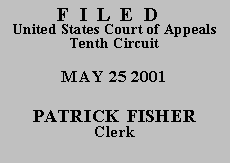

| ROBERT KNOWLES, JR.,
vs.
REGINALD HINES |
|
The parties are familiar with the facts and procedural history, so we need not repeat it, except as necessary for our analysis. Mr. Knowles pled guilty to two criminal offenses and was sentenced to "20 [years] to . . . be served as 120 nights" in the county jail. R. doc. 3, ex. C, at 2 (Plea of Guilty Summary of Facts).(1) After having failed to serve 120 nights of confinement within the prescribed time period, Mr. Knowles was sentenced to 20 years' imprisonment within the Department of Corrections. R. doc. 10, ex. B, at 2.
Mr. Knowles sought federal habeas relief on four grounds: (1) his sentence violated Oklahoma law; (2) he could only be sentenced to 120 nights of confinement in the county jail; (3) he had ineffective assistance of counsel; and (4) his second post-conviction petition should not have been procedurally barred. R. doc. 3, at 3-7. The district court concluded that Mr. Knowles' sentence was not a permissible option under Oklahoma law, and granted the writ unless Mr. Knowles was given the opportunity to withdraw his pleas. R. doc. 13. Mr. Knowles declined to do so, however, and his sentence, absent the provision for night-time confinement in the county jail, was reinstated by the state court. R. doc. 15, ex. B, at 3-4. Thereafter, the district court amended its judgment denying the writ as the condition it imposed had been fulfilled.
In a supplemental brief and reply brief to the district court, Mr. Knowles reasserted that he could only be sentenced to 120 nights of confinement in the county jail. R. doc. 22, at 2-8, doc. 24. The magistrate judge recommended that Mr. Knowles' petition be denied. Pursuant to Stewart v. State, 989 P.2d 940 (Okla. Crim. App. 1999), the Oklahoma courts "had the authority to re-sentence [Mr. Knowles] to a term of imprisonment within the statutorily prescribed range" as a matter of state law. R. doc. 25, at 6. To the extent that a different procedure was envisioned by Stewart, this failure to "follow state procedure . . . does not state a claim of constitutional magnitude" because his punishment did not exceed that permitted by statute. Id. Finally, the additional grounds asserted by Mr. Knowles for habeas relief--that he was deprived of effective assistance of counsel at sentencing and that his second post-conviction petition should not have been procedurally barred--were moot because Mr. Knowles was afforded the opportunity to withdraw his plea. Id. at 7. The district court adopted the magistrate judge's recommendation and denied Mr. Knowles' petition. R. doc. 28.
We have reviewed the record, including the district court orders, the magistrate judge's recommendations, and Mr. Knowles' application for a COA and accompanying brief. Having done so, we hold that Mr. Knowles has failed to "demonstrate that reasonable jurists would find the district court's assessment of the constitutional claims debatable or wrong." Slack v. McDaniel, 120 S.Ct. 1595, 1603-04 (2000). Mr. Knowles' challenge to his sentence, which was imposed pursuant to Stewart and is consistent with Oklahoma law and the OCCA's unpublished decision in Palmer v. Oklahoma, No. C-97-665 (Okla. Crim. Ct. App. July 2, 1998)(2), is not constitutionally cognizable. Dennis v. Poppel, 222 F.3d 1245, 1258 (10th Cir. 2000) (state law sentencing errors are not cognizable for federal habeas relief). Nor does Mr. Knowles' sentence implicate double jeopardy concerns. Ward v. Williams, 240 F.3d 1238, 1243 (10th Cir. 2001) ("Illegal sentences do not confer legitimate expectations of finality because they are subject to change. Furthermore, a defendant cannot gain a legitimate expectation of finality in a sentence that he challenged.").
Accordingly, we DENY the application for a COA and DISMISS the appeal.
Entered for the Court
Paul J. Kelly, Jr.
Circuit Judge
*. This order and judgment is not binding precedent, except under the doctrines of law of the case, res judicata, and collateral estoppel. This court generally disfavors the citation of orders and judgments; nevertheless, an order and judgment may be cited under the terms and conditions of 10th Cir. R. 36.3.
2. After examining the briefs and the appellate record, this three-judge panel has determined unanimously that oral argument would not be of material assistance in the determination of this appeal. See Fed. R. App. P. 34(a); 10th Cir. R. 34.1 (G). The cause is therefore ordered submitted without oral argument.
1. Mr. Knowles had been convicted of three prior felonies. R. doc. 3, ex. C, at 3.
2. Pursuant to Rule 3.5(C)(3), an unpublished opinion of the Oklahoma Court of Criminal Appeals is not binding on that court, but may be cited under certain conditions.